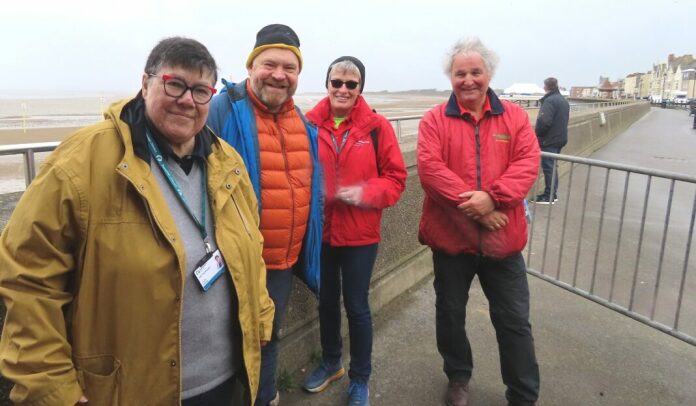Leaders of the new Somerset Council have this week pledged their support to maintaining funding for beach safety in Burnham-On-Sea, Brean and Berrow during a visit to local beach wardens.
Leader of Somerset Council, Councillor Bill Revans, and Lead Member for Local Government Reorganisation, Councillor Val Keitch, visited the beach wardens in Burnham-On-Sea to mark the launch of the new Somerset Council and the start of the new tourist season.
The new council took on responsibility for all services previously run by the County and district councils at the start of April.
The 14-strong beach wardens team are on duty daily between 10am and 6pm and are stationed at Burnham-On-Sea, Berrow and Brean beaches and will remain on duty until late September.
They supervise beaches, provide basic first aid, issue jetty permits, collect beach car parking fees, and provide general beach safety and advice.
Cllr Revans said during his visit that funding for beach safety – and RNLI lifeguards over the summer months – would “absolutely” be maintained.
“It’s an important function of the new unitary council – it is one that we have inherited from Sedgemoor District Council. We will be able to bring together services across the area.”
Cllr Revans went on to speak of the challenge of creating the new unitary council: “It’s been a huge amount of work – a mammoth task, bringing together five organisations into one, but business will carry on as usual in terms of delivering council services.”
“There are benefits across Somerset because it simplifies the system of local councils – you’ve got one council to contact rather than five. It also means we can have a single customer access point here in Burnham at the Library, for example.”
Asked about the promised savings for taxpayers, Cllr Revans added: “Overall, there will be some cash savings in rolling out the unitary because we can avoid duplication. We’ve got one chief executive now, not five, so we’ve already managed to save a few pennies there. We have made about £10 million worth of savings this year and we are expecting a similar figure next year but it is very early days yet.”
“The longer term benefits for me are that we can speak as one voice to Government so I think our message will get through much clearer, working with our MPs, to make sure that Government understands the issues that Somerset faces. Secondly, we can bring together our services in a much more co-ordinated and effective way, so, for example, our housing and social care systems will be much more integrated, similarly our planning and our highways functions. They’ll all be together and we will see less cases of one organisation passing on a question to the other.”
The new council set its first budget earlier this year, needing to plug a budget gap of more than £38m in light of increased demand for children’s services and adult social care.
Somerset taxpayers will see their council tax bills rise by the highest amount possible in the first year of the new unitary council – nearly five per cent. For the average Somerset taxpayer (known as Band D), council tax bills have risen to £1,646.04 per year – or a total of £135.95 per month.







